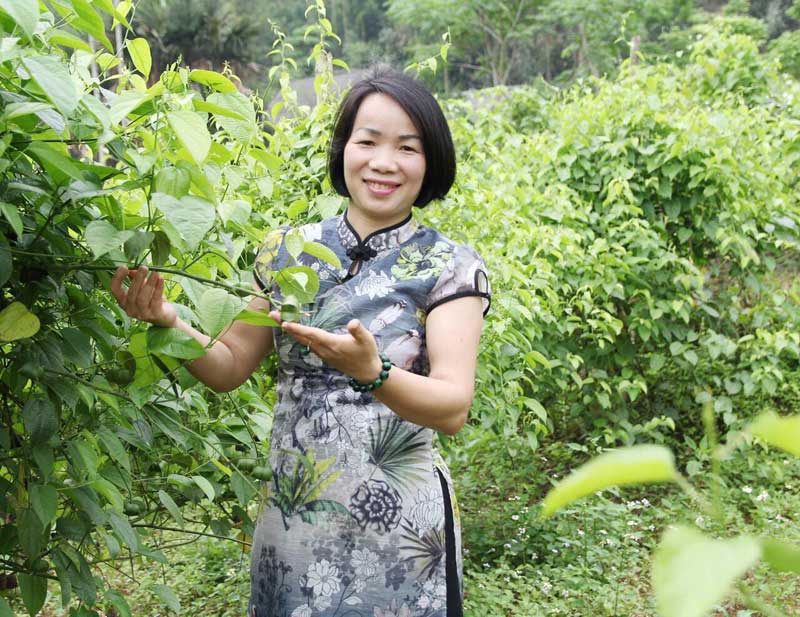
(HBO) – While having a happy, calm, stable but not rich life as a teacher, always being a strong rear for her husband, Ms. Le Thi Van (addressed at No. 89B, Bui Thi Xuan street, Group 24, Huu Nghi Ward, Hoa Binh city) suddenly took on a completely new job to "no roses" road, that is to become a businesswoman. Since then, she determined to face with the challenges in the market.

According to the study, the Sachi (Sacha
Inchi) plant is originated in the Amazon forest, where indigenous INCA people
have used for thousands of years as a health and longevity food supplement.
Sachi is currently being grown in some Southeast Asian countries such as
Thailand, Malaysia, Cambodia, etc. In Vietnam, Inca Vietnam joint Stock Company
being operated by Ms. Le Thi Van is the first company to conduct planting
trials and mass commercialization of Sachi trees.
Recalling the failure of planting Sachi
plants in Da Bac upland, Ms. Van said that it was due to the lack of experience
and doing, vice versa, she found out, analyzed the cause and inadequate
problems to overcome. Throughout the year of 2016, she coordinated with
Associate Professor Tram to study, formulate the process of developing raw
materials area. Along with that, she travels throughout the districts, cities
in the province, including the surrounding provinces to promote, advocate, and
find growers. However, she did not continue planting in the failed area.
Thanks to her passion and enthusiasm, up to
now, Sachi material plantation area has been expanded to 10 out of 11 districts
and city (excluding Lac Thuy district) with an area of 50 hectares inside and
50 hectares outside the province. Although the plantation is in the model
stage, Sachi trees have initially created trust for farmers by bringing in
stable income and output. The Company contracts with household groups and
organizes the purchase of all raw materials of the farmers with 10-year
contracts. Not only did the Company harvest Sachi fruit like other businesses,
but it also bought leaves for growers. "Seeing is better than
hearing", when the actual results are clear, the reliability of the
growers for the business is improved. The Sachi growers feel more believable
that they can get the long-term income from Sachi plantation, because the
plantation circle of Sachi trees is about ten years, they do not worry about
the output, and the income is 3-5 times higher than growing corn and rice.
Dao Village’s honey – a product certified with a 3-star OCOP (One Commune One Product) rating by Thong Nhat Agricultural Cooperative in Dao Village (Hoa Binh City) – is highly regarded by consumers for its quality, richness, and variety in packaging. The distinctively sweet taste of Dao Village’s honey leaves a lasting impression on anyone who has tried it.
In alignment with Project No. 07-DA/TU, issued by the Hoa Binh provincial Party Committee on November 1, 2021, Lac Thuy district has actively promoted investment and supported the sustainable development of its industrial and handicraft sectors during the 2021–2025 period. Alongside this, the district has remained committed to preserving and revitalising traditional craft villages.
Located in the northern part of Lac Thuy district, with a temperate climate and fertile soil, Phu Thanh commune has great potential and advantages in growing tea. The long-standing experience, combined with strict adherence to organic farming practices in the tea gardens, ensures that the dried tea products from Phu Thanh and Lac Thuy as a whole are sold out immediately upon production, providing a stable and prosperous life for the local people.
Amid efforts to streamline the administrative apparatus, Hoa Binh province has intensified measures to address challenges in land clearance, resettlement support, and infrastructure investment, aiming to speed up the progress of key projects.
Hoa Binh province has posted an unprecedented economic growth rate of 12.76% in the first quarter of 2025, marking its highest quarterly performance to date and positioning it as the second fastest-growing locality in the country, trailing only Bac Giang province.
Under current regulations, products in the One Commune – One Product (OCOP) programme that are rated three stars or higher must undergo re-evaluation every three months. However, in reality, some of these products fail to consistently meet the required standards, raising concerns about the sustainability of their OCOP certification. This underscores the urgent need for producers to enhance product quality and gradually develop their OCOP products into strong, marketable brands.



